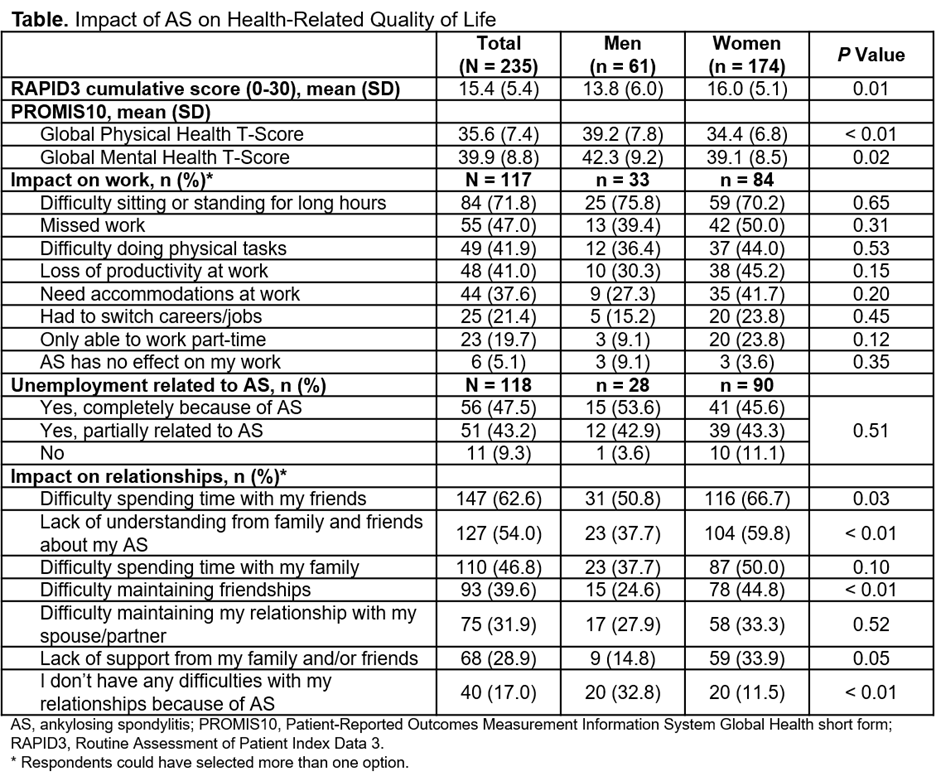Session Information
Date: Monday, October 22, 2018
Title: Patient Outcomes, Preferences, and Attitudes Poster I: Patient-Reported Outcomes
Session Type: ACR Poster Session B
Session Time: 9:00AM-11:00AM
Background/Purpose: Ankylosing spondylitis (AS) is a chronic, systemic, inflammatory disease that affects primarily the sacroiliac joints and spine and can cause irreversible damage. Measuring disease activity and quality of life of AS patients can be complex due to the slow progression and invisible nature of the disease. The objective of this web-based survey was to describe the impact of AS on health-related quality of life (HRQoL) from the US patient perspective.
Methods: US adults aged ≥ 18 years with a self-reported diagnosis of AS were recruited through CreakyJoints (www.CreakyJoints.org), an online patient support community comprising patients with arthritis and arthritis-related diseases and their caregivers, as well as through outreach on social media. Respondents completed a web-based survey that was designed to collect information on sociodemographic characteristics, clinical symptoms, disease burden, and the impact of AS on work productivity and relationships. Survey questions were developed following analysis of qualitative interviews of patients with AS and clinical experts, as well as a targeted literature review. Survey results were compared between men and women using 2-sample t tests for continuous variables and chi squared tests for categorical variables.
Results: Among 235 respondents, 174 (74.0%) were women, and the mean (SD) age was 49.8 (10.7) years. The mean (SD) and median (IQR) time since AS diagnosis was 8.5 (9.3) and 5.0 (2-12) years. Depression (62.1%), anxiety (54.5%), and fibromyalgia (35.7%) were the most commonly reported comorbidities among respondents. Women had significantly higher mean RAPID3 scores and lower PROMIS10 Global Physical and Mental Health T-Scores than men (Table). Approximately 90% of respondents reported either complete or partial unemployment due to AS. Most respondents (71.8%) had difficulty sitting or standing for long hours; other common issues related to work included missed work (47.0%), difficulty doing physical tasks (41.9%), and loss of productivity (41.0%) (Table). Although the impact of AS on work was not significantly different between men and women, the percentage of women with negative impact of AS on work was numerically higher in most categories. The most common impacts of AS on relationships were difficulty spending time with friends (62.6%), lack of understanding from friends and family about AS (54.0%), and difficulty spending time with family (46.8%) (Table).
Conclusion: Whereas the study findings demonstrate a considerable impact of AS on patients’ HRQoL including work productivity and relationships, these topics are often not discussed with their treating physicians, friends, and families. Encouraging patients to share their disease burden with their physicians and caregivers may help to optimize medical care and outcomes in patients with AS.
To cite this abstract in AMA style:
Nowell WB, Reynolds R, Gavigan K, Venkatachalam S, de la Cruz M, Flood E, Schwartz E, Romero B, Park Y, Ogdie A. Health-Related Quality of Life in Patients with Ankylosing Spondylitis in the United States [abstract]. Arthritis Rheumatol. 2018; 70 (suppl 9). https://acrabstracts.org/abstract/health-related-quality-of-life-in-patients-with-ankylosing-spondylitis-in-the-united-states/. Accessed .« Back to 2018 ACR/ARHP Annual Meeting
ACR Meeting Abstracts - https://acrabstracts.org/abstract/health-related-quality-of-life-in-patients-with-ankylosing-spondylitis-in-the-united-states/

